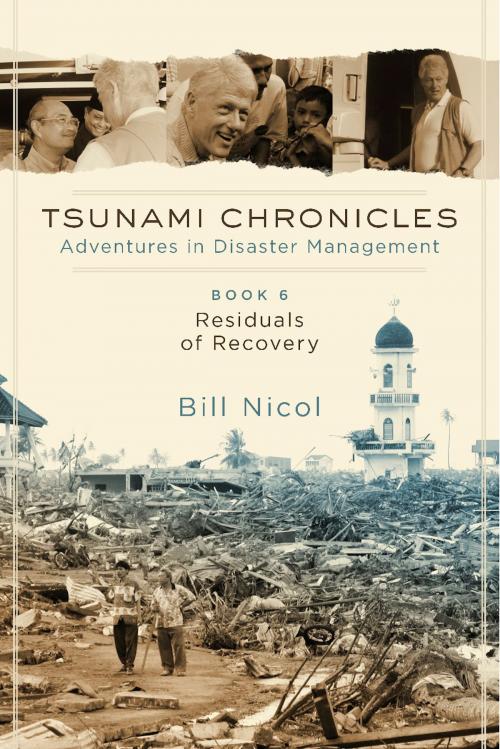| Author: | Bill Nicol | ISBN: | 9781483503073 |
| Publisher: | BookBaby | Publication: | July 17, 2013 |
| Imprint: | Language: | English |
| Author: | Bill Nicol |
| ISBN: | 9781483503073 |
| Publisher: | BookBaby |
| Publication: | July 17, 2013 |
| Imprint: | |
| Language: | English |
Few natural disasters come bigger than the 2004 Indian Ocean Tsunami. It left a trail of destruction from one side of the Indian Ocean to the other. Hardest hit was Aceh in Indonesia’s west where the tsunami killed almost a quarter of a million people, left half a million homeless and destroyed swathes of infrastructure. The global community responded with the largest military deployment since World War II plus billions in private and public charity. Four years later, Aceh had been rebuilt from the ground up in one of the world’s fastest and most successful disaster reconstruction programs, a stunning achievement given that so many international recovery operations fail. "Tsunami Chronicles: Adventures in Disaster Management" is a powerful series of six books written by a key insider. They offer a global case study in disaster risk management, preparedness and reconstruction, and a model of leadership in the politics of recovery and the management of operational complexity. “Residuals of Recovery” is the sixth and final book in the epic six-volume series “Tsunami Chronicles”. A compelling review of Indonesia’s recovery from the 2004 tsunami, it reveals how vital lessons were lost and misguided ones adopted to the great disadvantage of unsuspecting victims in far off Haiti, explains what works and what doesn’t in disaster recovery, draws out the essence of emergency leadership, reflects on Indonesia’s future and, to end this epic tale, provides a heartfelt sign-off from the author from his time at the centre of Indonesia’s emergency response, recovery and reconstruction operations. Above all, this concluding volume fills a vital gap by providing a political and managerial blueprint for those called on to lead a disaster recovery program. Critically, it includes but goes well beyond the fundamentals of management to cover the high-level politics, policies and coordinating mechanisms that can make or break any disaster reconstruction program. The immense relevance of this lives on as further natural disasters, global warming and climate change ensure that disaster risk management remains high on the agenda for the UN, international development agencies and humanitarian organisations like the Red Cross and international NGOs. “The most comprehensive and 'gem a page' book I have read on disaster management and, at last, a book that teaches practitioners on how to deal with the politics of a mega-disaster. Residuals of Recovery is a hard-hitting discussion on Lessons Learned and will save international organisations, UN, INGOs, Governments billions of dollars by following a sequence: Focus on Performance - Keep things Stable and Close Out The Game. Simplicity amidst chaos and complexity is possible if you have this book on your desk or in your backpack next to your GPS, passport and laptop.” —Bob McKerrow, retired Red Cross country head for Indonesia
Few natural disasters come bigger than the 2004 Indian Ocean Tsunami. It left a trail of destruction from one side of the Indian Ocean to the other. Hardest hit was Aceh in Indonesia’s west where the tsunami killed almost a quarter of a million people, left half a million homeless and destroyed swathes of infrastructure. The global community responded with the largest military deployment since World War II plus billions in private and public charity. Four years later, Aceh had been rebuilt from the ground up in one of the world’s fastest and most successful disaster reconstruction programs, a stunning achievement given that so many international recovery operations fail. "Tsunami Chronicles: Adventures in Disaster Management" is a powerful series of six books written by a key insider. They offer a global case study in disaster risk management, preparedness and reconstruction, and a model of leadership in the politics of recovery and the management of operational complexity. “Residuals of Recovery” is the sixth and final book in the epic six-volume series “Tsunami Chronicles”. A compelling review of Indonesia’s recovery from the 2004 tsunami, it reveals how vital lessons were lost and misguided ones adopted to the great disadvantage of unsuspecting victims in far off Haiti, explains what works and what doesn’t in disaster recovery, draws out the essence of emergency leadership, reflects on Indonesia’s future and, to end this epic tale, provides a heartfelt sign-off from the author from his time at the centre of Indonesia’s emergency response, recovery and reconstruction operations. Above all, this concluding volume fills a vital gap by providing a political and managerial blueprint for those called on to lead a disaster recovery program. Critically, it includes but goes well beyond the fundamentals of management to cover the high-level politics, policies and coordinating mechanisms that can make or break any disaster reconstruction program. The immense relevance of this lives on as further natural disasters, global warming and climate change ensure that disaster risk management remains high on the agenda for the UN, international development agencies and humanitarian organisations like the Red Cross and international NGOs. “The most comprehensive and 'gem a page' book I have read on disaster management and, at last, a book that teaches practitioners on how to deal with the politics of a mega-disaster. Residuals of Recovery is a hard-hitting discussion on Lessons Learned and will save international organisations, UN, INGOs, Governments billions of dollars by following a sequence: Focus on Performance - Keep things Stable and Close Out The Game. Simplicity amidst chaos and complexity is possible if you have this book on your desk or in your backpack next to your GPS, passport and laptop.” —Bob McKerrow, retired Red Cross country head for Indonesia















